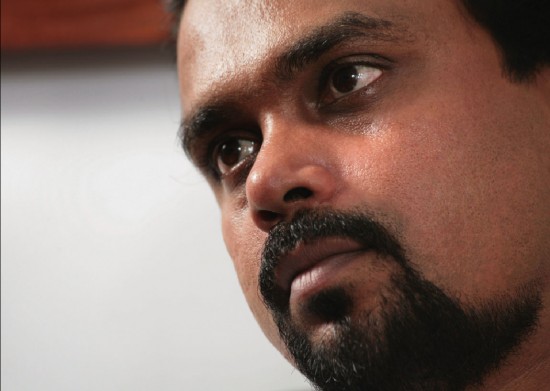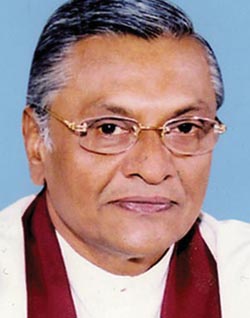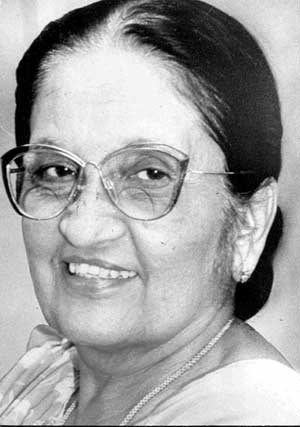Trajectory of an Impeachment
“Human progress is neither automatic nor inevitable… Every step toward the goal of justice requires sacrifice, suffering, and struggle; the tireless exertions and passionate concern of dedicated individuals.” – Martin Luther King, Jr.
Friday, 10th August
Divi Neguma Bill was published by gazette notification on the 10th of August and was included
in the Parliament order form. The Supreme Court thereafter ruled that the Divi Neguma Bill, according to the 13th Amendment to the Constitution, will get included in the Provincial Council list and hence, the Act should be submitted to the opinion of Provincial Councils and the President. The Divi Neguma Bill seeks to amalgamate the Samurdhi Authority of Sri Lanka, the Udarata Development Authority and the Southern Authority, in order to form a single body called the Department of Divi Neguma Development. The collective coffers would amount to nearly Rupees eighty billion.
Tuesday, 18th September
Chamal Rajapaksa, the Speaker of the House of Parliament, informs Parliament that the Supreme Court had ordered that the Divi Neguma Draft Bill should receive the approval of all Provincial Councils as it came within their scope. Leader of the House and Minister, Nimal Siripala de Silva informed the speaker that the ‘Divi Neguma’ Draft Bill will be withdrawn from the order paper in Parliament.
September 19 – Presentation
After the initial shock of the Supreme Court’s ruling, the Government takes steps to legitimize their attempt at seeking easier passage through Parliament for this Bill. They commence a step-by-step process of obtaining approval from each of the eight Provincial Councils, except of course the Northern Province which comes under the purview of a President-appointed Governor and where there has been no Provincial Council elected up to now. All other eight Provincial Councils come under the governance of the Government party.
Wednesday, 17th October
At a meeting held at his residence, Karu Jayasuriya informs the “Reformists Group” of the UNP that the Government is making preparations to impeach the Chief Justice. Answering inquiries from his inquisitive audience, Karu Jayasuriya confirms that he was quite positive of the authenticity of the stunning piece of news he intimated to the group.
Tuesday, 6th November
The impeachment motion against Chief Justice Shirani Bandaranayake was placed on the order paper of Parliament and there were fourteen charges listed against her. The motion signed by one hundred and seventeen MPs sought to appoint a select committee to probe these charges against the Chief Justice. This was to be followed by a resolution adopted by Parliament and presented to the President for the removal of the Chief Justice.
Wednesday 7th November
Speaker Chamal Rajapaksa had allocated four seats for the Opposition in the eleven-member
Parliamentary Select Committee (PSC), constituted to determine the Impeachment Motion against Chief Justice Shirani Bandaranayake. Chief Opposition Whip John Amaratunge received a letter from Dhammika Dassanayake, Secretary General of Parliament the previous day, requesting him to submit the names of four Opposition MPs to serve on the PSC, which would investigate the fourteen charges of misconduct leveled by one hundred and seventeen government MPs against the Chief Justice in both her official and personal capacities.
Nomination to the PSC
In the meanwhile, the Tamil National Alliance (TNA) nominated its leader MP Rajavarothiam Sampanthan and the Janatha Vimukthi Peramuna (JVP) nominated MP Vijitha Herath to the PSC. The United National Party nominated MP John Amaratunge and MP Lakshman Kiriella. The government also nominated its seven members to the PSC. They were MPs Anura Priyadarshana Yapa, Nimal Siripala de Silva, Susil Premjayanth, Dilan Perera, Neomal Perera, Rajitha Senaratne and Wimal Weerawansa.
Friday 23rd November
Chief Justice Shirani Bandaranayake appears before the Parliamentary Select Committee appointed to probe the alleged misconduct of the Chief Justice.
Sequence of events leading to the walk-out by CJ
This is a direct quote from the press statement issued by the Opposition MPs of the PSC: “When the motion was filed, there were no documents provided with it. The Inquiry started on 14th November 2012 without either a list of witnesses or a list of documents. After three sittings the Secretary General was instructed to call for the documents from the Banks and other institutions. What is obvious here is that when the Impeachment Motion was filed, none of the signatories could have seen any of the documents. It is regrettable that the Committee is ignoring salient provisions of the law and requirements of Natural Justice in the conduct of this Inquiry.”
Thursday, 6th December
Chief Justice Dr. Shirani Bandaranayake walks out of the PSC hearings.
Friday, 7th December
Opposition MPs withdraw from the sittings of the PSC. Later the same day the Opposition Group walks out of the Parliamentary sittings to mark their protest against the conduct of the Parliamentary Select Committee hearings.
Now we have reached an impasse regarding the whole episode of this bizarre impeachment motion brought by the Government against the Chief Justice of Sri Lanka. In the meanwhile, the Supreme Court is hearing a fundamental rights case on the validity of the Parliamentary Select Committee and the ruling is due on Friday, December 14. One of the most eminent lawyers in Sri Lanka today is handling matters on behalf of the petitioner. The screws will come unwinding if the Supreme Court declares that the PSC cannot conduct the proceedings of an impeachment motion against the Chief Justice.
Let us examine the various possible scenarios:
1. The Supreme Court decides that the PSC’s action is in order.
Then the Government can go ahead with their well-planned action program. The CJ will be impeached by Parliament since they enjoy a two-thirds majority. A naked violation of basic human rights would be commissioned in the name of their ‘justice’ and their ‘truth’. However, the repercussions, especially from the international community would be enormous. The government, in the writer’s view, is not capable of handling that sort of pressure in a sober manner. The ‘Parliamentary-supremacy-drum’ will be beaten over and over again by the ‘Weerawansa gang’. Nevertheless, the general apathy that has gripped the country will play a decisive role in the action that follows such a scenario.
2. The Supreme Court’s decision goes against the PSC
This scenario would entail a serious gridlock. The Government propaganda machine headed by the state-controlled radio and TV media outlets would commence their usual mud-slinging and vituperative character-assassination. The ultimate end of this process is too frightening even to imagine. The loss of face for the Government would be too hard to stomach. The pettiness of their campaign and the collective psyche of the Government will be exposed and the resulting venom and anger might cloud the thinking of those who govern. The ’goons’ would be unleashed and the real collapse of a complex system of governance would be their ultimate legacy, if they would have any legacy to talk about at all.
Opposition role crucial
In all these scenarios, the role that the Opposition plays would be crucial. It can give real leadership to a real movement of public opinion or it can fold its wings and collaborate with the Government party citing Parliamentary supremacy, an excuse that the Leader of the Opposition used (or abused) earlier when this matter of Parliamentary supremacy and sovereignty came for discussion and debate. It is appropriate to remember what really happened in the period between 1973 and 1977 in Sri Lanka.
Unity the UNP once enjoyed under JR
With Mrs. Sirimavo Bandaranaike in power and Felix Dias running amok like a petty-dictator, J
R Jayewardene, the then Leader of the UNP and the Opposition, with only seventeen MPs in the National State Assembly , as Parliament was called then, managed to terrify the SLFP-led Coalition with “satyagrahas” and other political campaigns. The unity that the UNP enjoyed at the time, the single-minded mindset that J R instilled in all his supporters, the sense of dedication and sacrifice he fiercely exhibited to his followers, clearly gave an signal to all those who doubted a UNP comeback in the wake of the ’70 election debacle, that the UNP was not dead. On the contrary, people were waiting for the ’77 election to happen. Such leadership is absent today. Expecting it from any quarter today is a dream. Yet people can and should dream. If the cause is right, the cause and the campaign will throw up a leader. Independence of the Judiciary is such a worthy cause.



